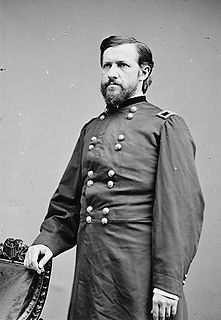This page is based on this
Wikipedia article Text is available under the
CC BY-SA 4.0 license; additional terms may apply.
Images, videos and audio are available under their respective licenses.
John or Jack Ross may refer to:
Thomas Watson may refer to:

Edmund Gibson Ross was a politician who represented Kansas after the American Civil War and was later governor of the New Mexico Territory. His vote against convicting President Andrew Johnson of "high crimes and misdemeanors" allowed Johnson to stay in office by the margin of one vote. As the seventh of seven Republican U.S. Senators to break with his party, Ross proved to be the person whose decision would result in conviction or acquittal. When he chose the latter, the vote of 35–19 in favor of Johnson's conviction failed to reach the required two-thirds vote. Ross lost his bid for re-election two years later.
Thomas, Tom or Tommy Boyd may refer to:
Thomas, Tom or Tommy Davis may refer to:

William Lee Davidson Ewing was a politician from Illinois who served partial terms as the fifth governor of the state and as U.S. Senator.
Thomas Bailey or Tom Bailey may refer to:
Thomas Murphy may refer to:

Hugh Boyle Ewing,, was a diplomat, author, attorney, and Union Army general during the American Civil War. He was a member of the prestigious Ewing family, son of Thomas Ewing, the eldest brother of Thomas Ewing, Jr. and Charles Ewing, and the foster brother and brother-in-law of William T. Sherman. General Ewing was an ambitious, literate, and erudite officer who held a strong sense of responsibility for the men under his command. He combined his West Point experience with the Civil War system of officer election.
The surname Ewing is of Scottish origin, and is an Anglicised form derived from the Gaelic clan name "Clann Eóghain" meaning "Children of Eóghain". The forename "Eógan" is thought to derive ultimately from the Greek eugenes.
Thomas Sherman may refer to:

1856 in the United States included some significant events that pushed the nation closer towards civil war.

The Missouri gubernatorial election of 1856 was Missouri's 11th gubernatorial election. In the election, which was held on August 2, 1852, the Democratic nominee, Trusten Polk, defeated Know-Nothing candidate Robert C. Ewing, and former Senator Thomas H. Benton. Benton ran as an Independent Democrat under the label "Benton Democrat."
Events from the year 1802 in Scotland.
Oscar R. Ewing was a 20th-century American lawyer, social reformer, and politician who was one of the main authors of the Fair Deal program of U.S. President Harry S. Truman.







